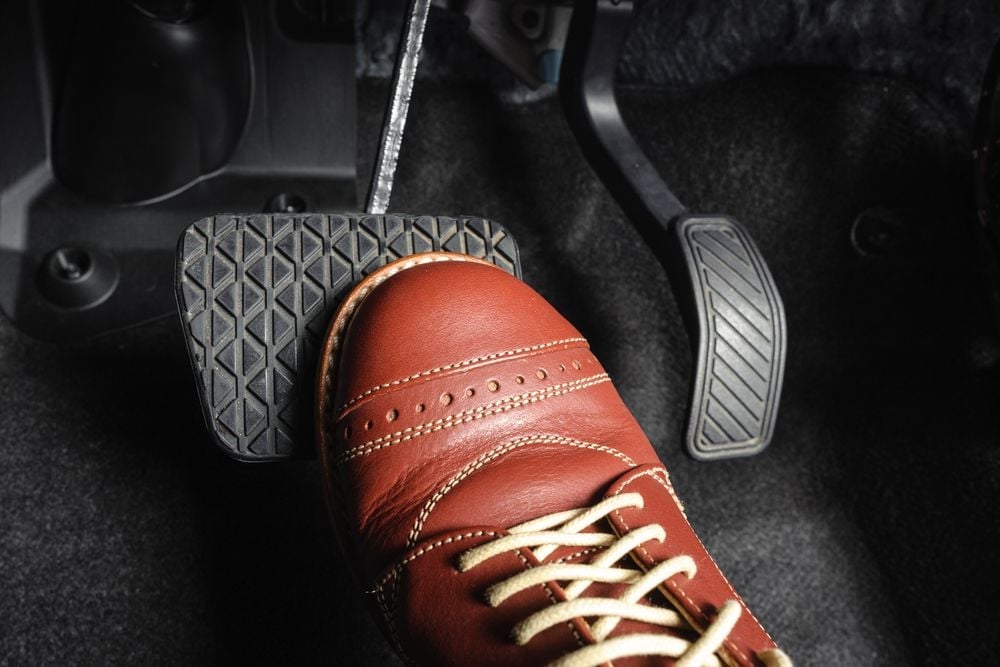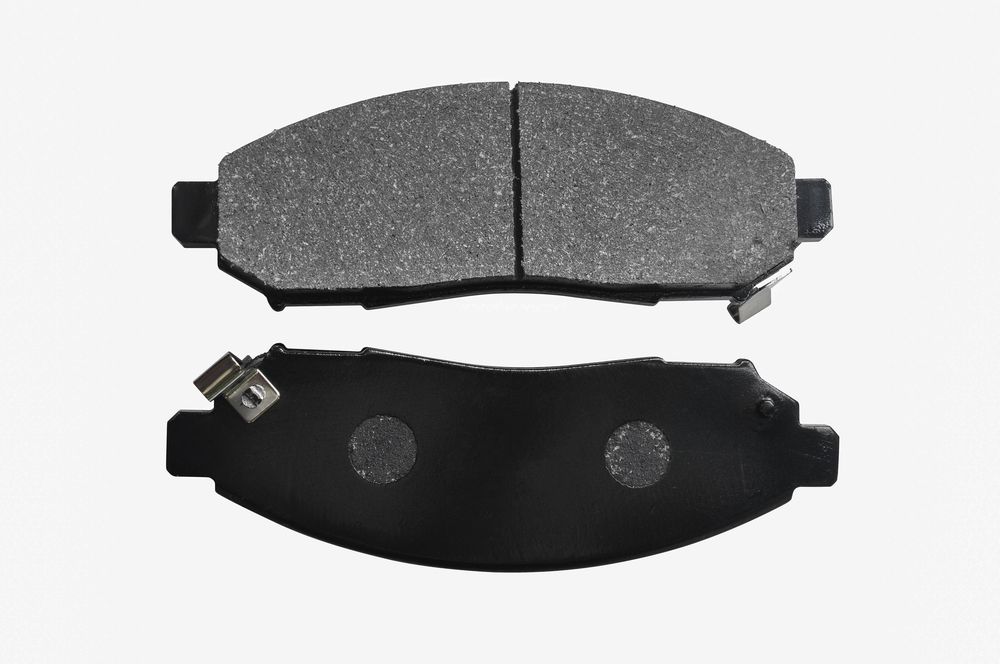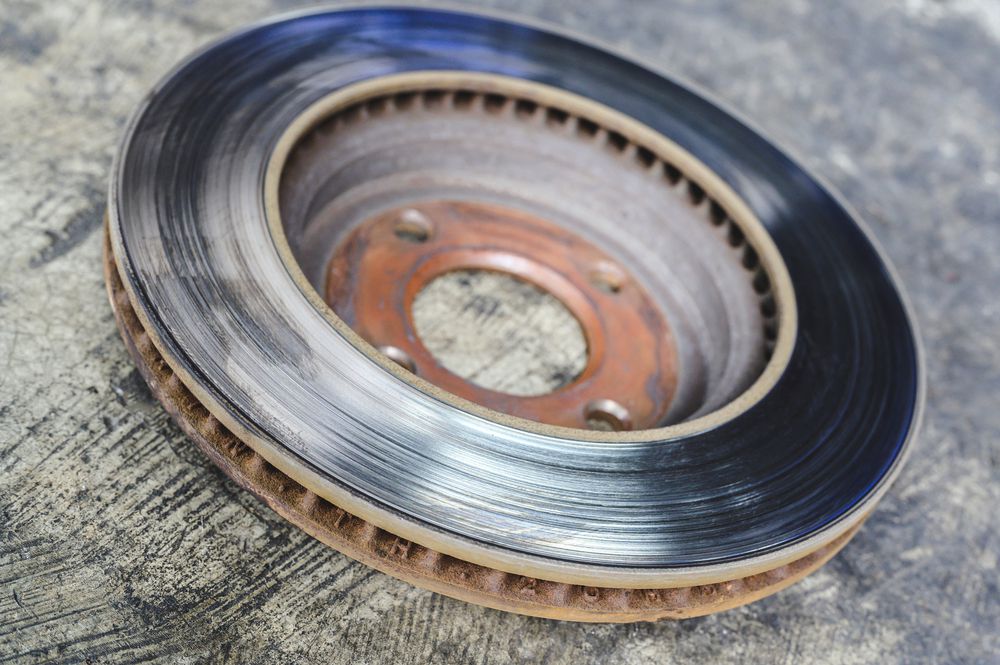
If your steering wheel shakes when you apply the brakes, it is most likely
a problem with your vehicle's braking system.
One of the most common symptoms of worn or malfunctioning brakes is a
shaking steering wheel when the brakes are applied. The causes of a shaking
steering wheel while braking includes warped rotors, worn brake pads,
malfunctioning brake caliper, or a malfunctioning ABS braking system.
Below we go over why a car's steering wheel would shake when the brakes are
applied and what a vehicle owner should do if it is happening in the
vehicle.
 Stopping a car causes the steering wheel to shake?
Stopping a car causes the steering wheel to shake?
What Causes Shaking When Braking?
A car may shake for various reasons, but if it only shakes while braking,
we can cross out things like unbalanced tires or bad wheel bearings and
narrow it down to a few possibilities.
Shaking while braking will often be felt in the vehicle's steering wheel
and could be caused by several mechanical problems, including problems with
the vehicle's disc brake rotors, low brake fluid, worn brake pads, or a
stuck brake caliper.
Possible causes of shaking while braking include:
1. Brand New Or Worn Brake Pads
A new brake pad may shudder or chatter, which will cause your vehicle to
shake or vibrate.
New brake pads and rotors should be broken in, also known as "bedded in,"
slowly over the first few hundred miles.
A new brake rotor does not have any friction surface on it. The friction
material is transferred from the brake pad due to friction and heat.
This transfer process should be done slowly and in a controlled fashion
over the first few hundred miles of the new rotor's life. If not, pad
material will build up too heavily on some parts of the rotor and too
lightly on others, leading to a wavy surface.
A brake pad won't engage properly with this wavy surface leading to brake
shudder and vibrations.
 New brake pads have a thin layer of bedding material that can cause vibrations.
New brake pads have a thin layer of bedding material that can cause vibrations.
2. Warped Brake Rotors
Warped rotors are a very common cause of vibrations and steering wheel
shake. When the brake pedal is applied, the brake pads press against the
rotor, which generates an extreme amount of heat.
The heat generated from braking will warp a rotor, especially a worn rotor
that has thinned if that heat is not allowed to dissipate quickly.
3. Malfunctioning Brake Calipers
A malfunctioning brake caliper could cause a vehicle to shake while braking
if it does not engage fully.
Brake calipers are what "squeeze" the brake pads together over the brake
rotor to stop the vehicle's wheel from rotating.
The brake caliper guide pins that the calipers slide over are greased to
allow the calipers to function freely; however, if there is a build-up of
grime, debris, or corrosion, the calipers may not fully actuate, leading to
intermittent contact and a shaking steering wheel while braking.
 Old warped brake rotors can cause shaking in the car steering wheel.
Old warped brake rotors can cause shaking in the car steering wheel.
4. ABS System
An ABS system will sometimes cause a vehicle to shake when the brakes are
applied. The purpose of anti-lock braking systems is to keep the brakes
from locking up when braking on slippery surfaces, thereby helping the
driver maintain control.
Read below to learn more about why an ABS system can cause a steering wheel
to shake.
Why Does My Steering Wheel Shake When I Brake At High Speeds?
If your steering wheel shakes when only braking at high speeds, it points
to a problem that has just started developing and will probably worsen over
time.
Your steering wheel shakes when braking at high speeds because the faster
you are going, the more load will be applied to the brake system, and it
will have to do a lot more work to stop the vehicle.
So, due to this increased load, vibrations or shaking will be significantly
amplified compared to if you were coming to a stop from a slow speed.
Steering Wheel Shakes When Braking At Low Speeds?
If you notice your steering wheel or car shake when braking at a low speed,
it points to a problem with your braking system that may be pretty serious.
A partially stuck brake caliper could cause shaking at low speeds that you
may overlook at higher speeds. A stuck brake caliper happens when the brake
caliper guide pins are insufficiently greased, and the brake caliper cannot
slide open or closed smoothly.
Steering Wheel Shaking When Braking Downhill?
A vehicle's brakes must do more work to stop a car when the vehicle is
moving downhill as compared to when it is going over flat land. This extra
work will add additional stress to the components of the vehicle's braking
system that will amplify any shaking or vibrations which otherwise may not
have occurred or been too small to notice.
 Braking while going downhill can load the brakes more than usual.
Braking while going downhill can load the brakes more than usual.
Can ABS Cause Vibration When Braking?
ABS braking systems, particularly in older vehicles, can cause the vehicle
to shake and vibrate when activated in certain situations.
ABS stands for anti-lock braking system, and they work to prevent the
vehicle's brakes from locking up and skidding when stopping on slippery
surfaces such as ice. ABS brakes help the driver maintain control when
braking; however, they don't necessarily shorten the stopping distance.
When the ABS system activates, the car may vibrate, and the brake pedal may
push back up against the driver's foot. This is normal.
Other Causes Of A Shaking Steering Wheel
If the steering wheel shakes while braking and driving straight at a
constant speed, you may have an unbalanced wheel or perhaps even loose lug
nuts that need to be tightened as soon as possible.
Other things like bad motor mounts, a failing transmission, and
problems
with the suspension system
can cause a shaky or vibrating steering wheel.
 A mechanic replacing a warped brake rotor.
A mechanic replacing a warped brake rotor.
Fixing A Steering Wheel That Shakes While Braking
You will most likely need to take your vehicle to a professional mechanic
to fix a steering wheel that shakes while braking.
Most likely, the mechanic will have to perform a complete brake service,
including replacing rotors and installing new brake pads. This will also
include rebuilding and/or greasing the brake calipers.
Check out our article titled "Steering Wheel Shakes While Driving" to learn
more if your steering wheel shakes while braking and in other
circumstances, such as accelerating, driving at high speeds, or turning.
Conclusion
A steering wheel that shakes only while braking is usually caused by warped
rotors but can also be caused by brand-new brake pads or malfunctioning
brake calipers.
When brake rotors overheat, particularly if they are thin due to wear, they
tend to warp with high and low spots, which will cause the car to shake
when the brakes are engaged.
Brake chatter, often caused by new brake pads or sticky brake calipers, can
also cause a shaking steering wheel or vibrations in the car.
The solution is often to make a repair service appointment with a
professional mechanic who should be able to get the problem diagnosed
promptly before it becomes a safety risk.